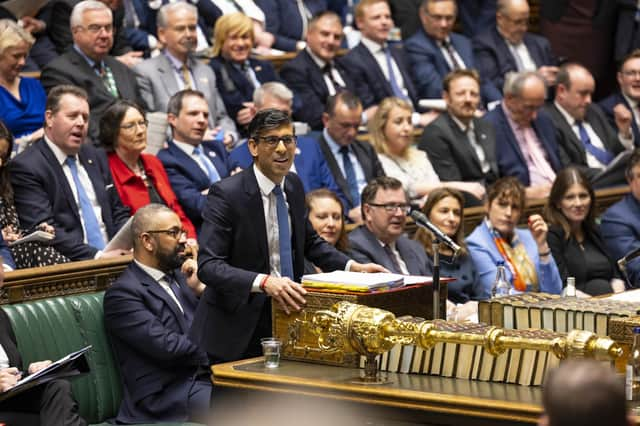Owen Polley: The new fault-lines in national politics are set to make things even more challenging for unionists than before


That is always a perilous position to be in and it happened again on Wednesday when a vote on the ‘Stormont Brake’ coincided with Boris Johnson’s appearance at the Privileges Committee’s hearing into ‘Partygate’. The ‘statutory instrument’ on the brake passed by a big margin, despite the opposition of the DUP and some high-profile Conservative MPs; meaning that the government will press ahead with the so-called ‘Windsor Framework’.
That creates a problem for unionists, because it looks like Northern Ireland will be permanently cut off from the rest of the UK’s economy, so that it can remain part of the EU’s single market for goods. Like many pro-Union people, when the government announced its new Northern Ireland Protocol deal with a document full of eye-catching claims, I was sceptical, but badly wanted them to be true. Despite all the cliches about intransigence and ‘never, never, never’, which were repeated again this week by the media and politicians in London, it is not good for unionism to be in a state of constant crisis and opposition.
Advertisement
Hide AdAdvertisement
Hide AdWe need a way to move on from Brexit and the protocol, but while Rishi Sunak’s Framework document looked like it might provide one, under scrutiny, the promises it made collapsed into dust one after another.
In addition, the government was so evasive about many of the legitimate issues that were raised about its deal, that, even if you were inclined to accept its claims initially, by now you would be doubtful. Your suspicions would not have been allayed when Rishi Sunak ducked a proper vote on the Windsor Framework, using the ‘Stormont Brake’ as ‘indicative’ of the entire package, and pushed it through quickly, avoiding committee stages that normally accompany such measures.
Against the backdrop of these manoeuvres, after some procrastination, the DUP decided that it could not claim with credibility that the deal met its ‘seven tests’. On Wednesday, Sir Jeffrey Donaldson told the European Research Group (ERG) of Brexiteer Tory MPs that there was no basis for his party to resume power-sharing ‘at this stage’.
The DUP leader said he would continue to work with the government to “solve these issues” (with the Framework). But Downing Street made it clear that it sees its agreement as a permanent solution to the protocol and does not intend to re-open negotiations with the EU.
Advertisement
Hide AdAdvertisement
Hide AdThat leaves two possibilities. Either the DUP’s complaints could be addressed through new UK legislation, which would almost certainly be greeted with hostility in Brussels. Or the government will continue to ‘engage’ with Donaldson, but has no intention of acting on his concerns. Undoubtedly, if the DUP had endorsed the Stormont Brake, it would have appeared like an absurd climbdown on its seven tests, even if its eight member consultation panel had provided a rationale.
It could not possibly have justified returning to power-sharing immediately either, because that would inevitably have been interpreted as grudging acceptance of the framework and an acknowledgement that it was prepared to move on. There was no way that the DUP could be seen back at the assembly in two weeks time, taking the applause of Joe Biden and other expected visitors, when, by its own analysis, Northern Ireland’s place in the Union remained profoundly damaged.
Equally, though, if preventing devolution no longer seems to be having an effect, then it will eventually start to lose the party support. And the government has engineered a situation whereby, in theory at least, unionists could play a role in stopping new EU regulations coming into force here, if they were back at Stormont. The government would certainly blame the DUP for allowing Northern Ireland to diverge further from the rest of the UK’s market, if the party still observed a boycott while new law from Brussels came into force.
It seems, on the surface, then, like Rishi Sunak got his way and outwitted his critics in the DUP and in his own party. But he shouldn’t feel too complacent just yet. The number of Conservative rebels last Wednesday was small, but it included influential MPs and ex-party leaders. Indeed, many of the 40 odd genuine abstentions might have been encouraged to vote against the prime minister, if it hadn’t been for the cynical and hypocritical presence in the ‘no’ lobby of his predecessor, Boris Johnson.
Advertisement
Hide AdAdvertisement
Hide AdSunak’s supporters claimed that his authority was enhanced by the vote and the eurosceptic wing of his party was tamed. If, as anticipated, though, the Conservatives are defeated by Labour at the next election, expect this concession of British territory to the EU to become the focus of attempts to resist Sunak’s leadership and remould the Tory party.
From our perspective in Northern Ireland, that may seem like an obscure and irrelevant aspect of the whole saga. In the shorter-term, we can even expect a Labour government under Keir Starmer to align more closely with Brussels, which may, for a time, see internal UK barriers soften.
If you look carefully, though, you can see new fault-lines developing in national politics that suggest the civil war over Brexit is far from over. Northern Ireland is likely to have a central role in these debates that may continue to destabilise politics here and eat away at the Union.